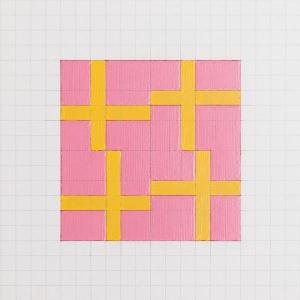
Karol Bethke: Kreuz 33 (1986)
© Karol Bethke
Karol Bethke (1940–2017) was a German painter, illustrator and sculptor. He is regarded as a proponent of Concrete Art, the program for which was birthed a hundred years ago. After studying painting under Hermann Bachmann at Munich’s Haus der Kunst (House of Art), Bethke exhibited prolifically both at home and abroad. He was awarded a coveted MoMA PS 1 fellowship in 1980. After spending several years in New York, the artist returned to Berlin in 1984, remaining here until his death. The exhibition at the CAS centers around Bethke’s works on paper, in which he used vivid gloss paints and fine lines to explore the relationship between painting and drawing.
Introductions:
- Marie-Luise Heske is curator and consultant at the Stiftung für Konkrete Kunst und Design Ingolstadt (Ingolstadt Foundation for Concrete Art and Design). The foundation – the leading initiative for the promotion of Concrete Art in Germany – has its home at the Museum für Konkrete Kunst, MKK (Museum of Concrete Art). Her most recent assignment involved curating the widely acclaimed exhibition “Martin Creed. I don’t know what art is”.
- Mario Günther is Academic Councilor at LMU‘s Munich Center for Mathematical Philosophy (MCMP). His theory of learning conditional information won him the Wolfgang Stegmüller Prize. In the winter semester 2023/24, Günther was Junior Researcher in Residence at the CAS.
Karol Bethke’s estate is represented by Bernheimer Contemporary.
Since 2008, a series of temporary exhibitions have been held on the premises of the CAS in cooperation with UniGalerieLMU.
Advance registration is required to attend the exhibition. For more information, please visit the CAS website.
The Center for Advanced Studies at LMU provides a forum for scientific exchange and discussion that bridges the divide between the established disciplines. Its activities are designed to promote all forms of collaborative research and to stimulate interdisciplinary communication within the University. In addition, it facilitates the integration of visiting scholars and scientists into the academic life of the University.
